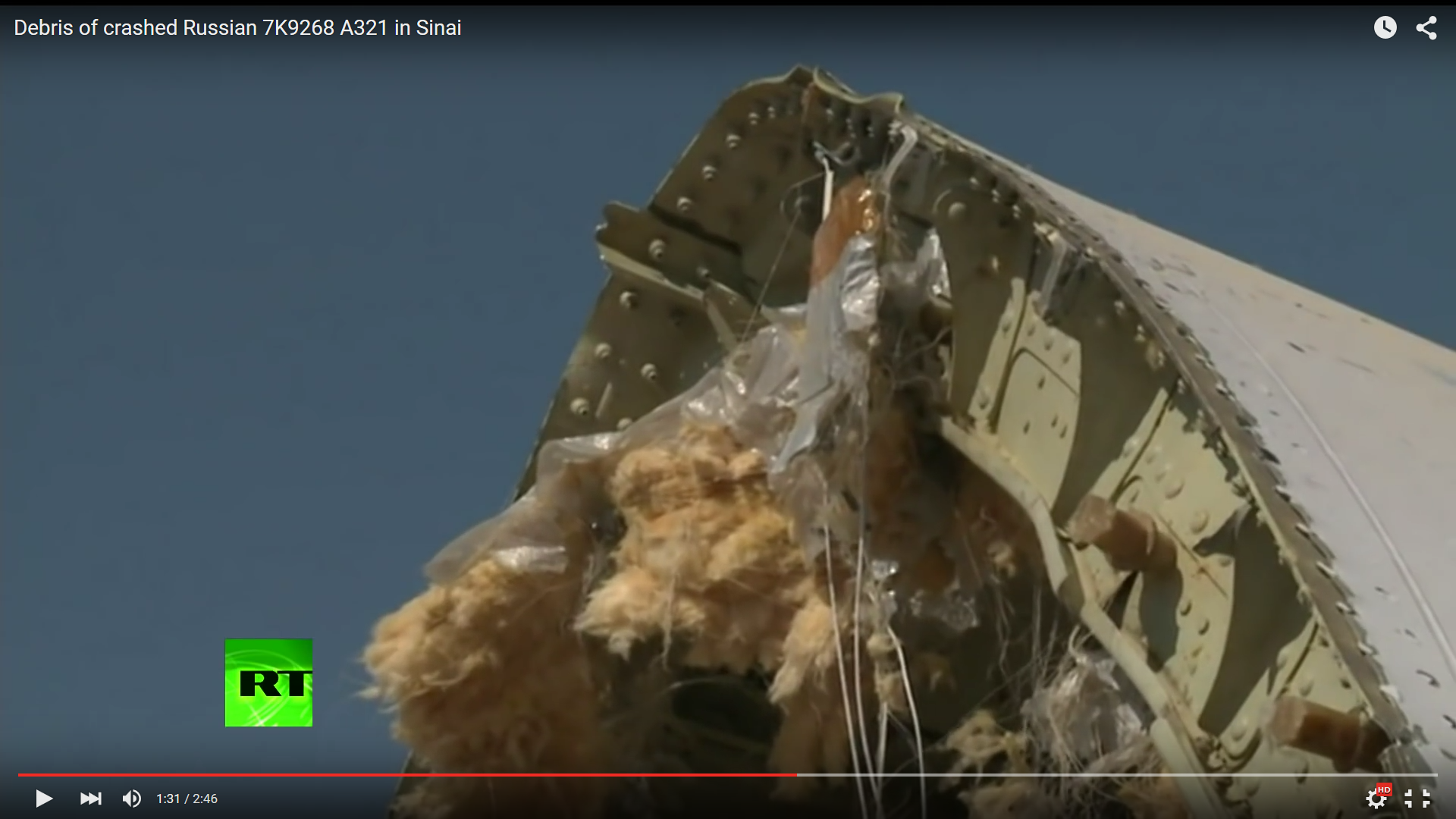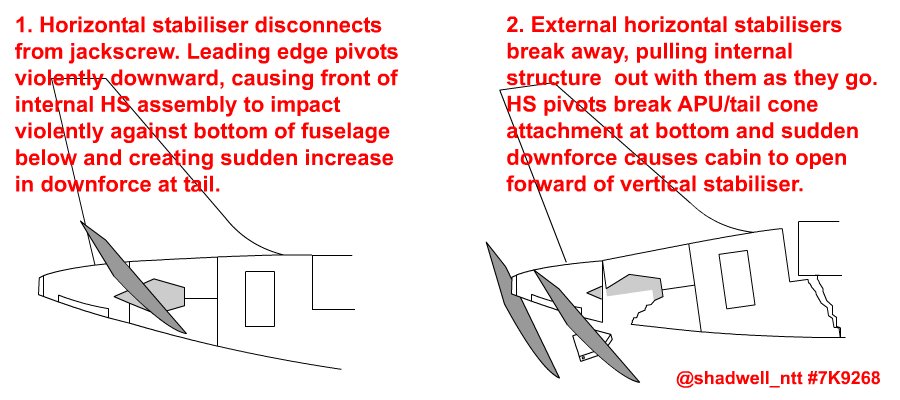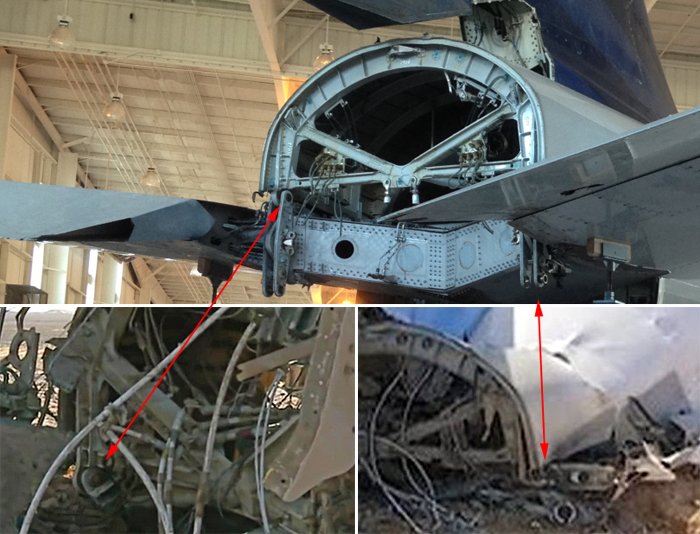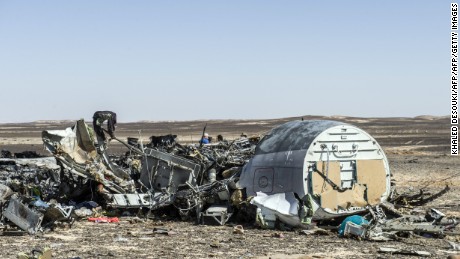
You are looking at the top part of the section attachment just behind the windows.

The way the skin tore off is definitely not a clean fatigue crack, but an extreme pull on the metal, finally giving in at the weakest point namely the perforation for the first rivet row.
I can come up with only one explanation for such extreme pull, namely the momentum of a strong (and probably sudden) downward force at the tail. Something like depicted here.

This person thinks the jackscrew failed, but there are more possibilities, like a computer going mad, etc... Let that be determined by the investigators. One thing is for sure, the plane must be intact to put up such pull force. Making bomb stories less likely.
If you look at pictures towards the back of the tail section, you will see only the top half of the stabilizer compartment. If you look very good, there is only sand underneath, not the flat folded bottom half.

All this brings me to the following sequence of events.
1) The front of the stabilizer goes extremely down
2) The pull of the momentum in the roof makes it fail along the rivets of a production weakness. Starting from the top, stopping at the stronger attachments near the floor.
3) The stabilizers can't hold the pressure and sheer off.
4) The plane tumbles/soars/spirals further down and at 2.2 km before impact the floor cannot hold the tail section anymore and it rips off.
5) After that point the fire in the main section must have begun, because the tail section is clean of burn marks.
Kind regards, Vincent
 ... So what kind of bulkhead is this? Not the one forward (door to the cockpit is missing).
... So what kind of bulkhead is this? Not the one forward (door to the cockpit is missing).  ... same part from another angle. When you read the label on the door, you can see, this part is laying upside down.
... same part from another angle. When you read the label on the door, you can see, this part is laying upside down. ... this is the open APU compartment of an A320. I don't think, it is much different on an A321. You can clearly see the same bulkhead forward as in the crash photos.
... this is the open APU compartment of an A320. I don't think, it is much different on an A321. You can clearly see the same bulkhead forward as in the crash photos. ... now, I admittedly took this pic from one of those conspiracy websites. I have seen it in other news as well, but they had actually still some resolution on it. The point that makes me scratch my head is, if this authentic, then we see a rear entrance door here. Which obviously should BEFORE the bulkhead and the APU behind it. But then, what the heck is the bulkhead in the pics above? An A321, as far as I can find, has only two bulkhead-like walls going through the whole diameter of the fuselage: Foreard to the cockpit (which is actually no real pressure bulkhead but nowadays relative massive because it has to secure the cockpit against terrorists in the passenger cabin) and the rear one. However, this one has the one, we saw in the pics above and it had to have one before the APU compartment. Now, the A321 has a seating capacity of 220 passengers max with lowest low cost cattle class seating throughout the plane (as in one-class config). That is consistent with the number of victims (crew and passengers added up), but it means, the plane was fully loaded. There was no cut off compartment extra. So what's the story, any ideas?
... now, I admittedly took this pic from one of those conspiracy websites. I have seen it in other news as well, but they had actually still some resolution on it. The point that makes me scratch my head is, if this authentic, then we see a rear entrance door here. Which obviously should BEFORE the bulkhead and the APU behind it. But then, what the heck is the bulkhead in the pics above? An A321, as far as I can find, has only two bulkhead-like walls going through the whole diameter of the fuselage: Foreard to the cockpit (which is actually no real pressure bulkhead but nowadays relative massive because it has to secure the cockpit against terrorists in the passenger cabin) and the rear one. However, this one has the one, we saw in the pics above and it had to have one before the APU compartment. Now, the A321 has a seating capacity of 220 passengers max with lowest low cost cattle class seating throughout the plane (as in one-class config). That is consistent with the number of victims (crew and passengers added up), but it means, the plane was fully loaded. There was no cut off compartment extra. So what's the story, any ideas?